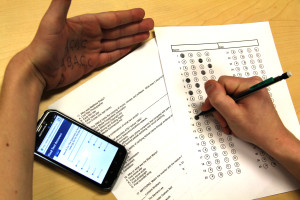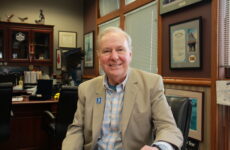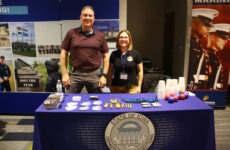Staff Writer
Cheating has long been a problem in academics.
From a recent cheating scandal at Harvard which involved over 200 students to a student copying a paper at DMACC, cheating has remained an issue for students and faculty alike. This issue has been especially common as more degrees are sought for accreditation rather than the opportunity to learn.
“In seconds, I can google a topic and get an essay,” English professor Sharran Slinkard said.
More frequently, Slinkard has seen students try anything from plagiarizing a concert review from the Des Moines Register to not giving proper credit to quotes or ideas used in essays.
Failure to properly cite information from any source is considered cheating.
“We have to document everything,” said Slinkard.
Part of the problem is many students aren’t clear on how DMACC defines academic dishonesty. According to the DMACC student handbook, academic dishonesty is defined as plagiarism, falsifying tests or papers by dishonest means, collaborating with another student during a test, and substituting for another another students work amongst others.
“Even if you paraphrase and don’t use your own words and style, that still constitutes plagiarism,” Slinkard said.
Like any campus, DMACC has students that cheat and plagiarize, but most students interviewed addressed the the futility of cheating.
“You don’t learn the material by cheating.” Blake Mikesell, currently at DMACC for his AA Degree, said.
“Without putting effort into it, you’re not going to retain any information,” Ian Reid, a student taking online classes for Liberal Arts, said.
With the greater adoption of online learning, cheating has also been a major issue. To combat this, some instructors have taken an open book approach, letting students use any tools at their disposal.
Other instructors have instead opted for a more traditional approach to combat cheating. Tests are timed in many cases, and certain instructors will have students attend an in-class session for major assignments. “On big tests such as midterms and finals, they have us use a proctor to verify we don’t cheat,” said Reid.
Although the the higher presence of technology in students lives have
made it easier to cheat, it has also made it easier for instructors to pick out work that isn’t legitimate.
“To those who do it deliberately, this is what we do.” Slinkard said.
“An entire essay plagiarized is obviously not the student’s personal style.”
Instructors also have the added benefit of websites like turnitin.com which verifies the validity of essays against a database of existing works.
“Regardless of who the cheater is, they cheat because they are lazy.” said Slinkard.
Slinkard also spoke about how many students see cheating in the short term, ignoring the effects cheating can have on personal development.






Comments